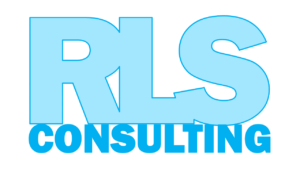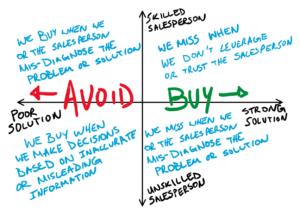The Buyer’s Challenge – Part 3
This article is related to a larger discussion about the “Buyer’s Challenge” and references topics introduced in the main article here: The Buyer’s Challenge
If you’re starting here, we are breaking down the challenges that keep buyers from getting to a strong solution, or that would help them avoid a poor solution, by looking at each of 4 different scenarios that can occur.
This article covers Part 3:
- A Strong Solution and a Salesperson with Low Skillsets
In this situation, the buyer found their way into the right company based on the solution they need for their problem, but there’s an unskilled salesperson standing between them and the decision.
So, what can happen?
The solution and problem could become misaligned.
If the salesperson wasn’t able to really help pin the root cause of the problem you’re trying to solve, or help you uncover the true cost of staying with the status quo, you may decide it’s not worthwhile to proceed.
They may have even inadvertently shifted your focus to the completely wrong issue. Or, they may have heard a problem they know they can solve and jumped straight to a solution – before diving deeper into what else was going on.
Without seeing the full value of a solution, it may be hard to get internal buy-in.
A skilled salesperson is going to be able to help you create a vision for the future state of your business, after the solution is in place. If they can’t do this well or don’t provide you with the information you need to pass along internally, you may not be able to get decision makers to see the fit.
A strong competitor could bump the right solution out of the running.
Sometimes a salesperson may be able to identify something their solution is uniquely able to address that others can’t, and they may be knowledgeable enough about the marketplace to help you avoid going with a sub-par solution. However, if the person helping you doesn’t understand where they fit in the market, you may not have the information you need when comparing vendors.
How I’ve personally seen this scenario play out:
In this quadrant, I think back about my own sales career and times when I was very new to the industry or a particular market. Even the reps with the best intentions may fail the buyer here.
When I first started in technology sales, I was fortunate to have access to a lot of great mentors, resources, and training. It was great and I continually think fondly of the peers and managers that helped me grow.
We all need to start somewhere, and those of us that have learned a lot usually had our fair share of failures to get us there (I’ve certainly taken some bumps and bruises over the years).
I recall getting lists of questions and details to collect in calls that would help guide conversations. As a newbie, I didn’t really understand what I was doing or asking. I treated it like an interview more than a conversation.
I’m sure there was plenty I missed as I look back; clues about bigger issues that my client couldn’t see from their perspective, or times when they glossed over details and I should have asked what they meant.
Often, as a new rep, you have a fear of sounding like you don’t know what you’re doing. So, you tiptoe around certain things when you could just ask the client to give a little more context.

This situation played out in a recent purchase I made:
Not long ago, I was looking for an upgrade for a current software product my team was using. We were already a customer of this vendor and they offered a limited time offer for current users to upgrade to the next level product before a price increase was coming.
The rep was great, very friendly, and knowledgeable about their product. But, as we talked about our use of the product and goals for the future, they weren’t picking up on clues I was giving them. I already had a strong understanding of this product and knew where the value was in the new level – but I wanted to let them do their thing.
I nudged them in the right direction a few times, pointing out which things could help us the most and why, while also highlighting things that were of little value to us and why.
In the end, they provided me with an offer and their recommendations but nothing really showed us why it would make sense to increase our investment.
They had failed to uncover that we were growing and that, within a couple months, we’d basically be paying more for the lower tier than the higher tier was worth today. Furthermore, the additional tools could have given us the ability to win a few extra clients – and had they asked about our average deal size and uncovered more information, they would have seen that this would have paid for itself rather quickly.
We ended up still buying because I knew the problem, value of the solution, and could craft my own internal message to decision makers. Had we solely relied on the rep, I wouldn’t have gotten the approval to go forward, the business case wasn’t there.
How do you avoid this?
As with many of these scenarios, education is going to be important. This includes gathering critical information throughout the sales process by asking questions about the company and what makes them unique.
Beyond education, don’t fully rely on the salesperson to help you analyze your problem and its root cause. Prepare for sales conversations by doing a deep problem analysis before inviting others to the discussion.
Start building an internal dialog about the problems and value of a solution. Look to stakeholders and decision makers to ensure that you understand the way this problem/solution impacts their responsibilities and the overall business. Be ready to build a strong case for implementing a solution you are confident can help the business.
Continue Exploring The Buyer's Challenge
This article is just part of a larger discussion. Explore other scenarios and solutions as we continue exploring The Buyer’s Challenge:
The next posts in this series will drop over the week and the links above will be made active as it releases.
If you want to follow along, be sure to sign up for the newsletter through the form below.
Share

Ryan Smith
Ryan's experience across cybersecurity, sales, insurance, technology, education, and mathematics have helped him become a business-oriented problem solver that can simplify complex topics.
His eclectic and diverse background is now able to be leveraged by businesses that are interested in outside perspectives to help them overcome challenges.
Popular Posts

RLS Consulting Is (Re)Opening for Business!

Cybersecurity Begins at the Individual

The Buyer’s Challenge
Newsletter
Looking for Identity Theft Protection?
RLS Consulting is a proud distributor of defend-id ©.
Learn how protecting your employees from the perils of Identity Theft and Fraud can help your business security and overhead costs.
Want to sell defend-id through your insurance agency?
Learn More


